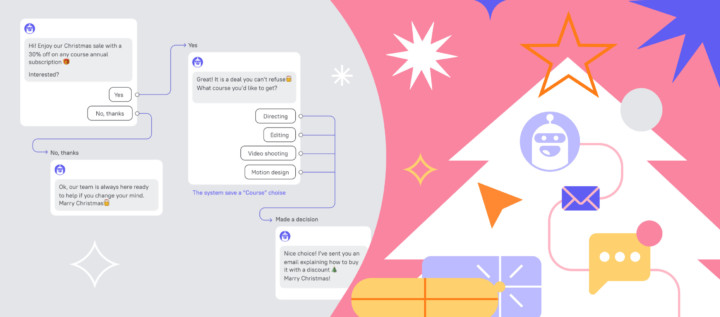Mastering AI prospecting: A step-by-step how-to guide
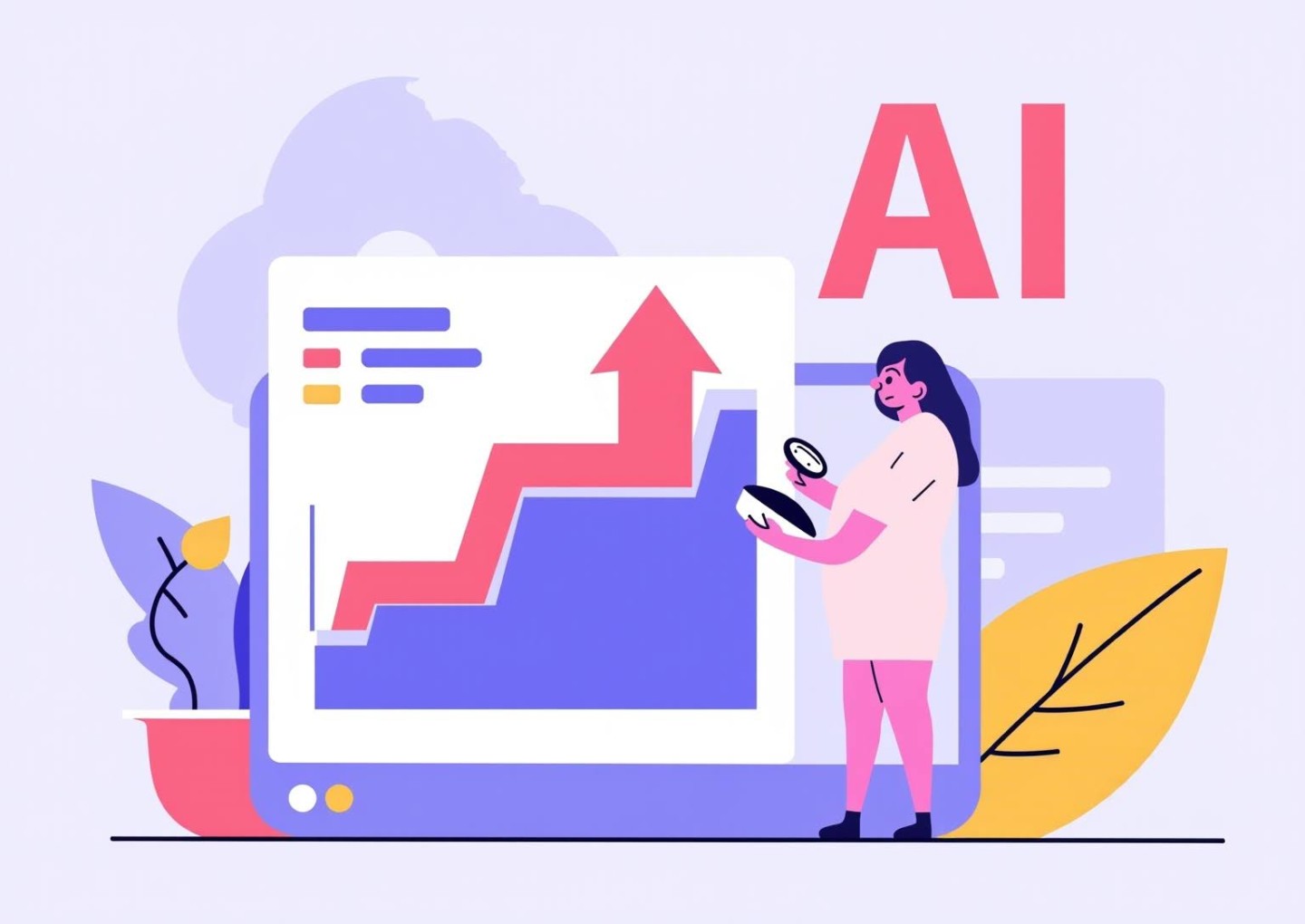
The transformative role of artificial intelligence (AI) in sales prospecting cannot be overstated. AI revolutionizes the way sales teams operate by automating and refining processes that traditionally consumed significant time and resources. With the power of advanced machine learning algorithms, AI can sift through extensive datasets to uncover patterns and insights that human representatives might miss, thereby enabling businesses to focus on high-value leads.
This technology not only enhances efficiency but also personalizes customer interactions, boosting conversion rates and overall effectiveness.
Dashly’s platform, for instance, demonstrates how AI tools can automate up to 90% of the appointment booking process, filtering leads based on quality and ensuring that only the most valuable ones reach sales teams. This not only saves significant time but also boosts conversion rates by allowing human representatives to focus on high-potential leads.
As more companies integrate AI into their sales strategies, it becomes clear that this technology is not just an enhancement but a strategic necessity for maintaining a competitive edge. Embracing AI-powered tools in sales prospecting ensures that sales teams can adapt proactively to evolving customer needs and market dynamics, thereby driving sustained growth and success.
Understanding AI’s role in sales prospecting
AI is transforming prospecting by automating and refining various processes, resulting in significant time savings and productivity gains for teams. By leveraging advanced machine learning algorithms, AI can analyze extensive datasets efficiently, uncovering patterns and insights that might be missed by human representatives. This capability enables businesses to focus their efforts on high-value leads, enhancing overall efficiency and effectiveness.
Dashly excels in this area by automating lead qualification and segmentation. The platform categorizes leads into high and low quality, sending 60-70% of non-MQL leads into self-serve funnels and ensuring salespeople focus only on the top-tier opportunities. This strategic filtering optimizes team productivity and significantly reduces wasted effort on low-quality prospects.
Notably, 35% of professionals in commerce report that AI has automated manual tasks, saving them an average of 2 hours and 15 minutes, which can be redirected towards closing deals or engaging with prospects. Dashly reports similar efficiency gains, with 93% of scheduled meetings being attended and 75% of qualified leads automatically booking a call. By implementing solutions like Dashly, companies can achieve unprecedented levels of productivity.
Furthermore, AI enables sales groups through accurate audience segmentation and content customization, which enhances conversion rates. By choosing high-quality information and creating models that represent the diversity of the customer base and the intricacy of transaction processes, companies can guarantee the precision and significance of AI-driven insights.
Dashly also tackles the problem of manual lead scoring and scheduling. Through its quiz-based qualification, sales teams experience higher SLA compliance, and Dashly’s predictive models forecast outcomes with an accuracy rate of 98.3%, bringing reliability to revenue projections.
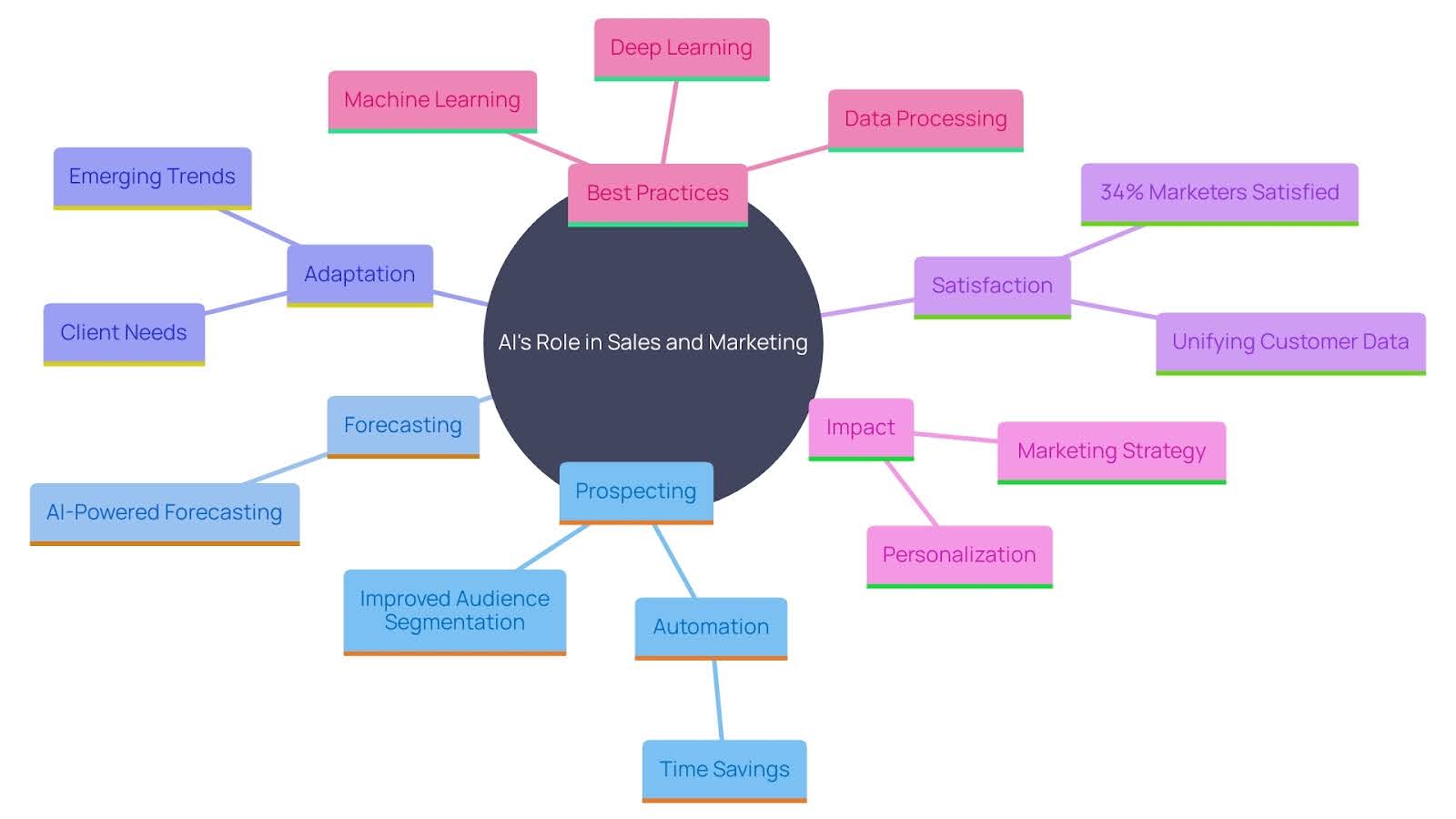
Building an effective AI prospecting strategy
Creating an effective AI prospecting strategy begins with aligning your sales objectives with AI capabilities. Start by defining your target audience and ideal customer profiles. Next, integrate AI tools that can analyze data and generate leads based on these profiles.
With Dashly, businesses can automate lead-to-account matching and use live chat bots for real-time qualification, seamlessly integrating these capabilities into existing CRMs to boost pipeline efficiency.
Establish clear metrics for success and continuously evaluate the effectiveness of your AI systems to refine your strategy. Dashly users have witnessed open email rates between 50-60%, significantly higher than the market average of 20-30%, showcasing how AI-driven communications can outperform traditional approaches. For instance, utilizing AI to predict client behavior (a primary application for 29% of users) can enhance your targeting efforts.
Dashly’s predictive analytics even help sales managers by setting up lead nurturing campaigns that ensure high engagement rates, like a 55% conversion from email open to meeting scheduled. This not only improves your prospecting, but also ensures you’re maximizing the return on investment in AI tools.
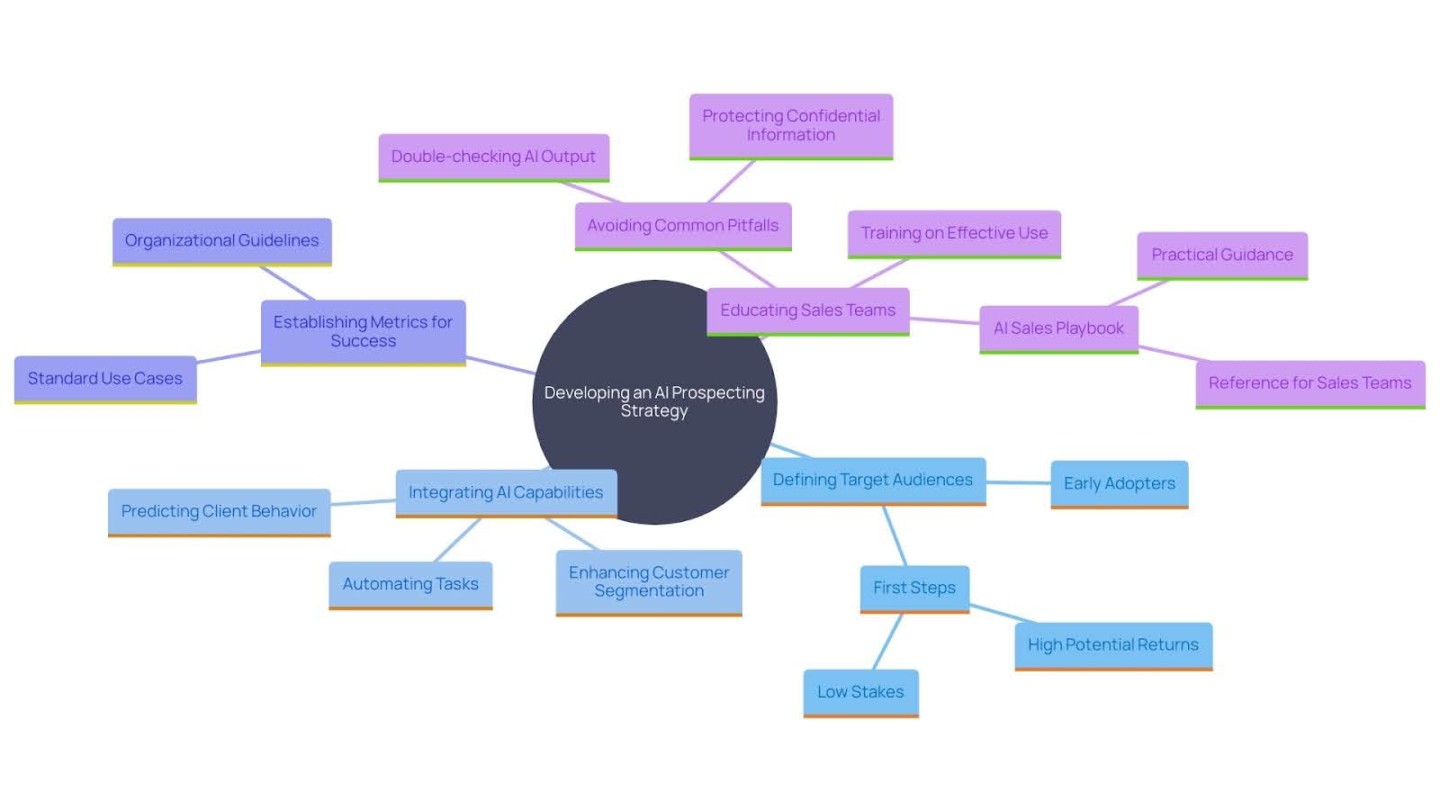
Step 1: Identifying ideal prospects with AI
The first step in mastering AI prospecting is to leverage AI tools to identify your ideal prospects. Advanced algorithms analyze demographic data, purchase histories, and online behavior to construct detailed profiles of potential leads. This data-driven approach allows you to pinpoint individuals or companies that closely match your ideal customer criteria, significantly enhancing the chances of successful engagement.
Dashly’s Opportunity Index helps sales teams focus their energy on leads most likely to convert, automating data collection and CRM integration, so salespeople can work efficiently. By ensuring that only high-quality leads progress to the scheduling stage, Dashly saves businesses time and boosts growth.
For instance, Draup’s Opportunity Index demonstrates how AI can quantify the probability of an organization engaging in an outsourcing partnership with vendors. Similarly, Dashly employs algorithms to prioritize and schedule meetings, eliminating bottlenecks and keeping the sales funnel flowing.
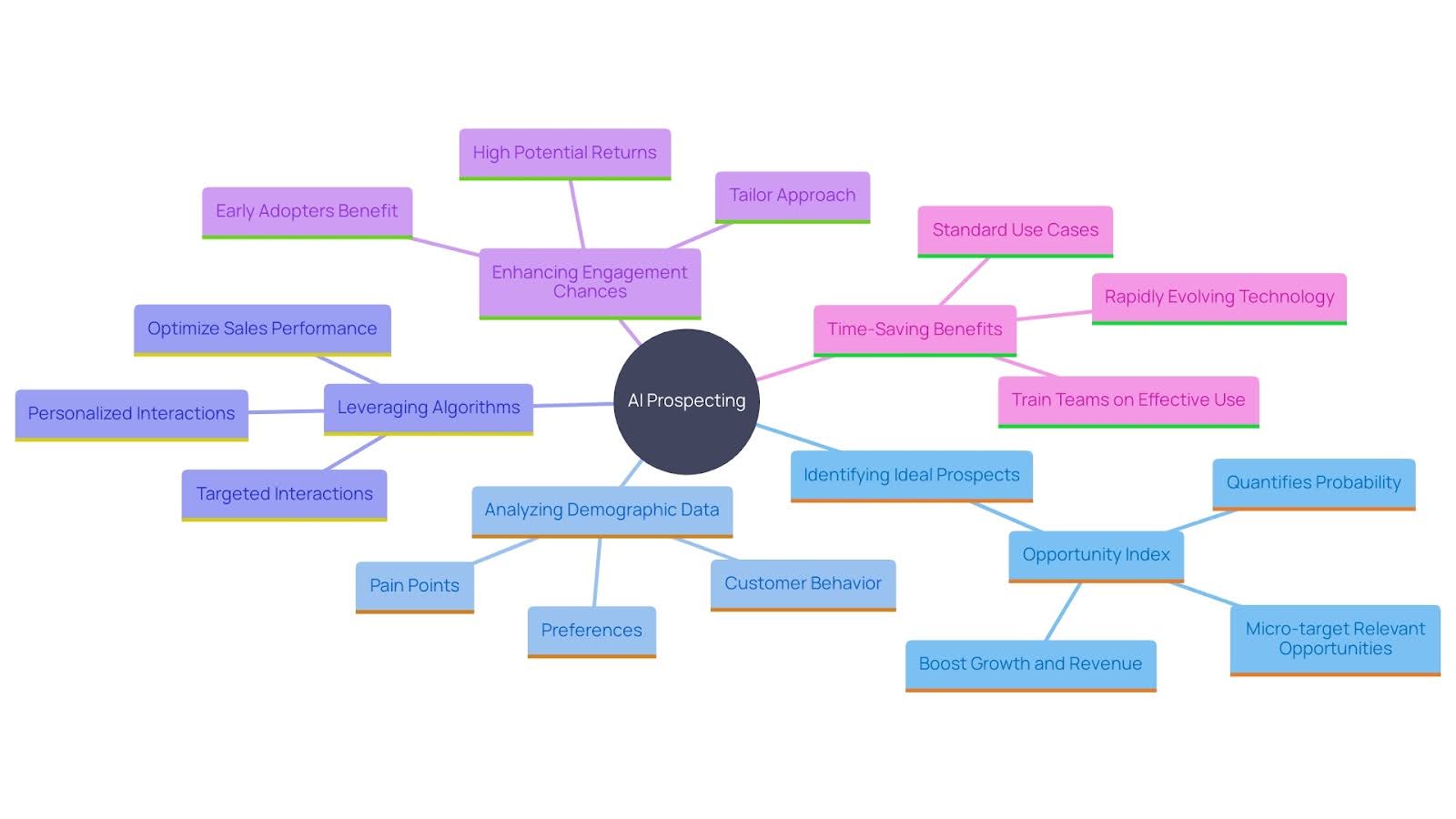
Step 2: Researching prospects using AI tools
After identifying your ideal prospects, the next step is utilizing AI resources for comprehensive research. These tools can swiftly gather data from a plethora of sources including social media, news articles, and company websites, offering a comprehensive view of each prospect’s interests, challenges, and latest activities.
Dashly’s automated qualification and email sequences take this a step further, nurturing leads even if they haven’t immediately scheduled a meeting. The system follows up with strategically crafted emails that drive engagement and optimize the lead-to-meeting conversion.
This abundant source of information enables marketing groups to customize their outreach approaches accurately, rendering them more pertinent and captivating. Instead of manually managing follow-ups, Dashly automates this process, which can significantly shorten the sales cycle and increase efficiency. As AI continues to evolve, early adopters who incorporate these resources will likely advance ahead of their competitors.
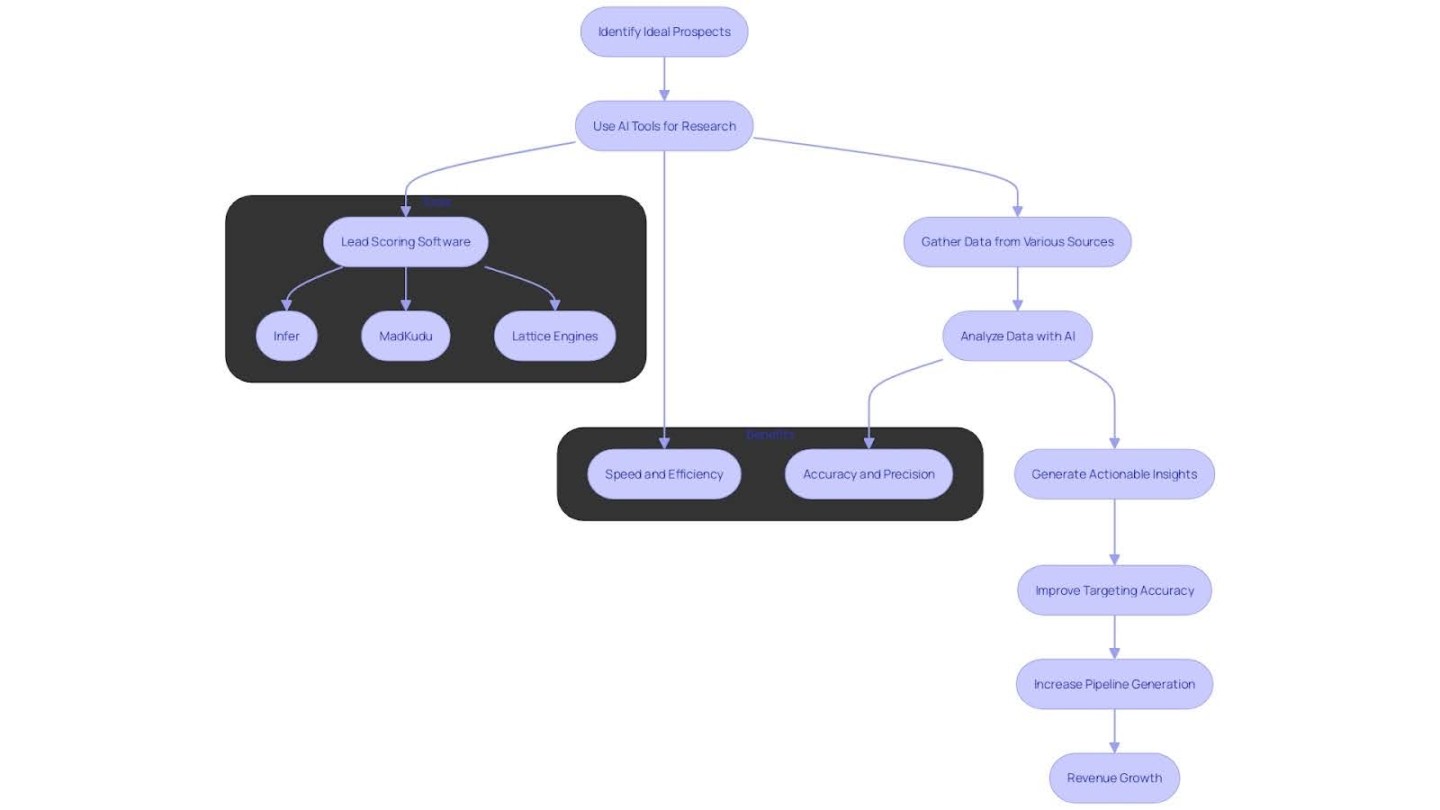
Step 3: Crafting personalized outreach plans with AI
With the insights gained from your research, you can now craft personalized outreach plans tailored to each prospect. AI can assist in creating effective messaging strategies by analyzing which types of content and communication styles yield the best results.
Dashly’s AI-driven outreach helps customize email content, achieving open rates well above the industry standard and optimizing the timing of each message to ensure higher engagement. These automation features have been proven to reduce no-shows and increase meeting attendance rates.
By leveraging this data, you can develop a multi-channel approach that includes email, social media, and direct messaging, ensuring your outreach is relevant and engaging. Dashly clients, for example, have seen 90% of their meetings successfully scheduled through automated processes, emphasizing the power of AI in streamlining interactions.
A practical AI Sales Playbook can act as a beneficial guide for sales groups, assisting organizations in utilizing AI resources efficiently while protecting against extra risk.
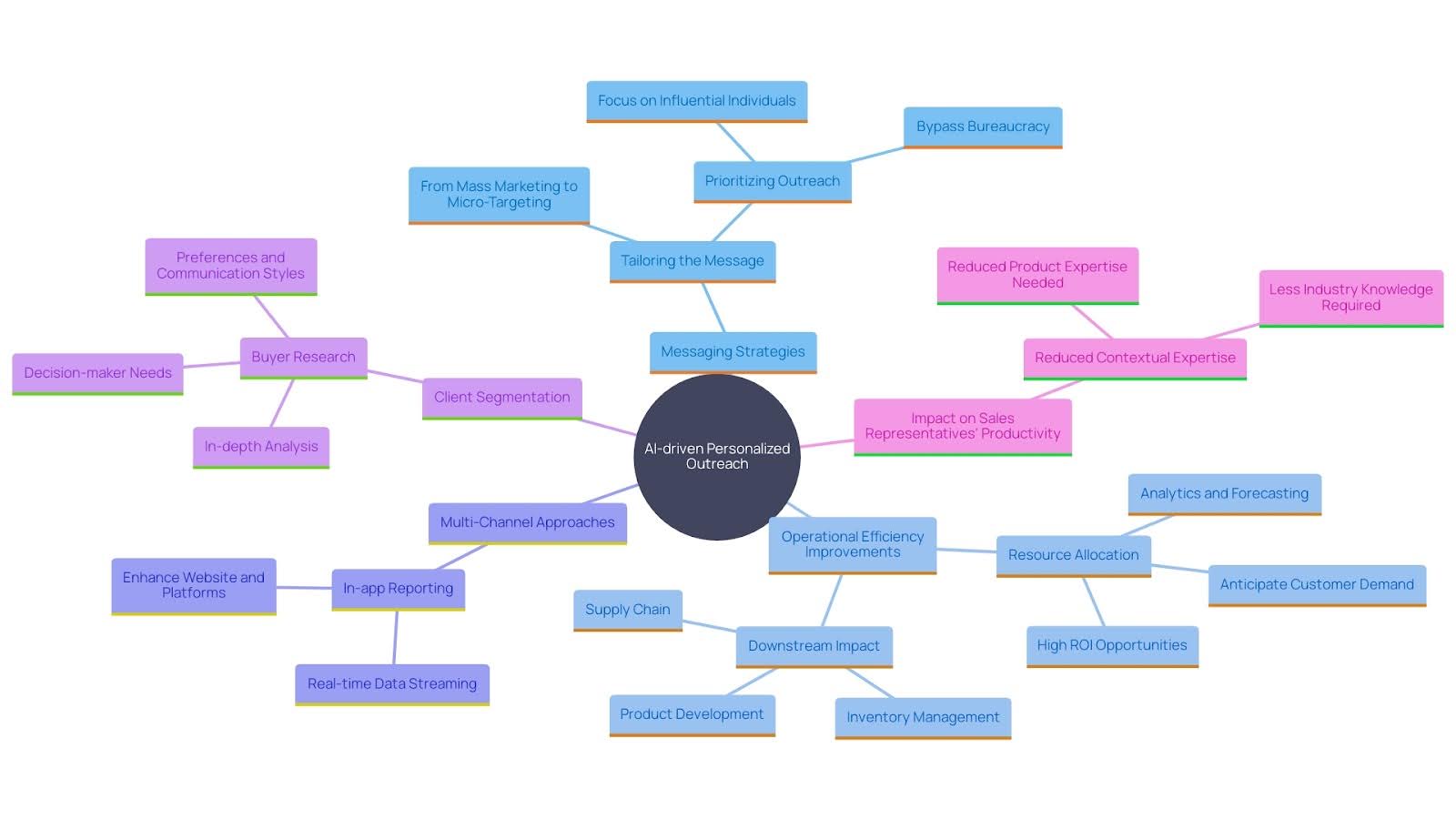
Practical tips for implementing AI in sales prospecting
Using AI in customer prospecting requires a thoughtful approach. First, make sure your sales team knows how to use the AI tools at their disposal. It’s not just about having the technology; they need to understand how to interpret the data and turn insights into action. AI can process massive amounts of data in real time, revealing insights into what customers care about and what drives their decisions. This helps your marketing team adjust strategies quickly, making every engagement more personalized and effective.
It’s also important to get your revenue and marketing teams working together. Unified strategies work best, especially when leveraging AI. Companies that bring AI into their processes early are already pulling ahead. If you’re just getting started, focus on areas where you can see a big return without a lot of risk. Keep testing and tweaking your AI models based on feedback and results. This constant improvement cycle will keep your organization competitive as things change.
Consider this: a Marketbridge survey found that 52% of C-suite leaders believe AI makes marketing and revenue spending more efficient. And according to Pipedrive, 42% of small companies (with fewer than 10 employees) are using AI, compared to 37% of medium companies and just 23% of large ones. Clearly, adoption is spreading across all sizes of businesses.
Early adopters gain a huge advantage, using AI like a real-time co-pilot to guide deals and optimize results. But there are risks, like AI bias or inaccurate data. To avoid these pitfalls, set clear guidelines and give your team examples of how to use AI effectively. An AI Sales Playbook can be a valuable resource, helping teams use AI confidently and get the most out of it while minimizing mistakes.
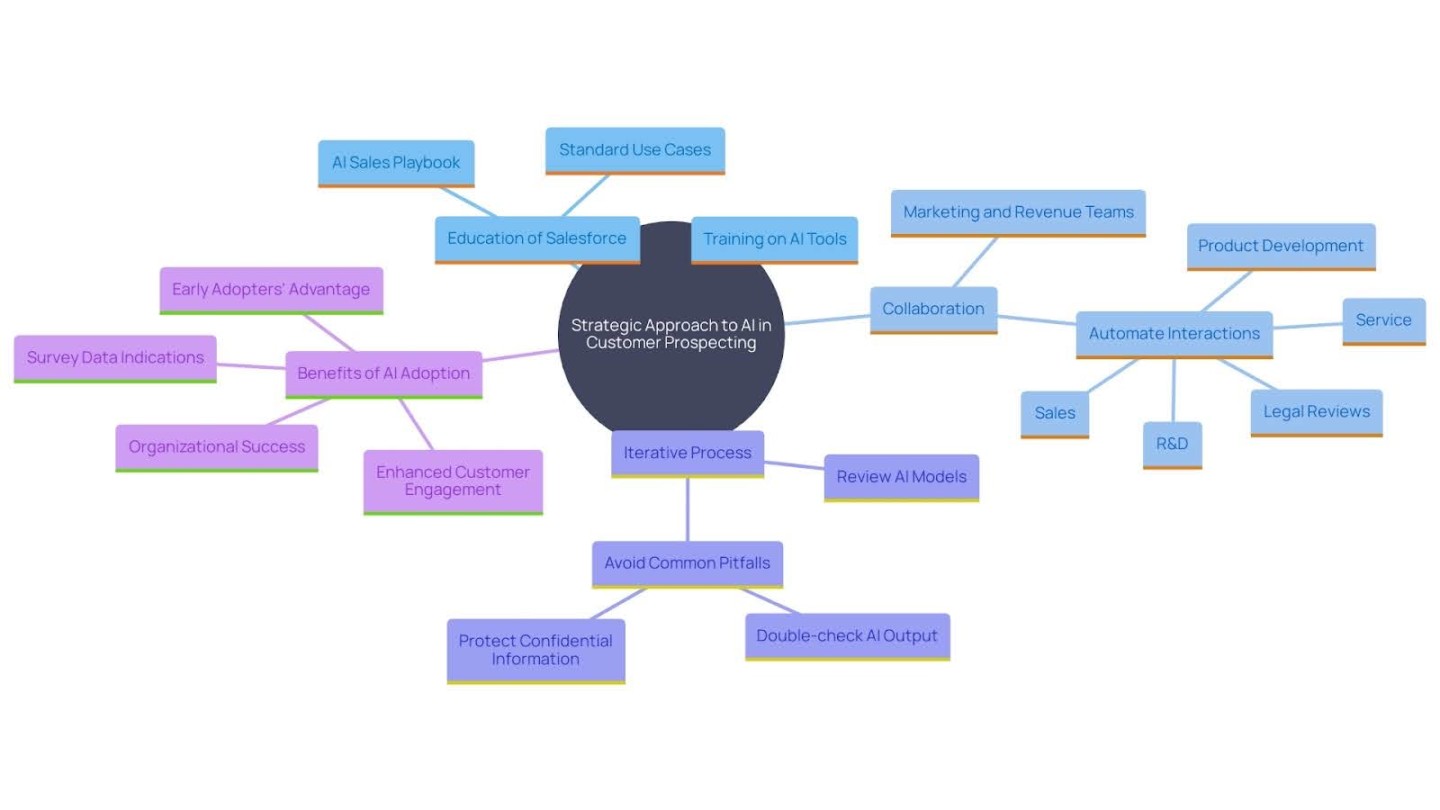
Customizing AI tools for enhanced engagement
Customization is key to maximizing the benefits of AI in prospecting. Customizing AI tools to suit particular business requirements and client profiles can result in increased client interaction and enhanced revenue efficiency.
Dashly’s lead scoring and qualification solutions are perfect examples of this customization. By analyzing specific business needs, Dashly tailors the lead funnel, categorizing and directing high-potential leads to human teams while routing others through self-serve options.
Moreover, aligning AI systems with existing CRM platforms can create a seamless workflow, enabling teams to utilize accurate customer segmentation and content personalization. This method not only streamlines transaction processes but also guarantees that AI investments generate substantial returns.
Overcoming common challenges in AI prospecting
While AI has tons of advantages, it doesn’t come without challenges. These challenges can be big, but if you deal with them early, you can make AI work for you.
The first hurdle is data quality. AI runs on data, and bad data means bad results. You need to make sure your data is accurate and reliable. Think of it like this: if you feed your AI flawed information, the insights it spits out won’t be useful. This means building models that reflect the complexity and variety of your customers. Do this right, and you’re setting a strong foundation for future AI success.
Next, there’s resistance to change. People in sales teams may be uncomfortable using AI because it’s new and different. The fix? Training and education. The more your team understands how AI works and what it can do, the more confident they’ll feel using it. Companies should have guidelines, best practices, and plenty of use cases to show what works. When people see how AI can make their lives easier—like automating tasks they hate doing—they’ll be more willing to jump on board.
Then there’s the issue of integration. Adding AI to your existing systems can feel overwhelming. To make it easier, get expert help. Focus on integrating AI in areas with high potential returns but where the risks are low. By easing into it, you can avoid problems like data bias, inaccurate predictions, or privacy concerns.
But once you get AI up and running, the benefits can be huge. It can help you keep customers by predicting who’s likely to leave, segment your audience more effectively, and personalize content to boost conversions. For example, AI can analyze past purchases and suggest related products, which can lead to more sales. If you tackle these challenges head-on, AI can be a real game-changer, making your sales team more efficient and giving your company a big competitive edge.
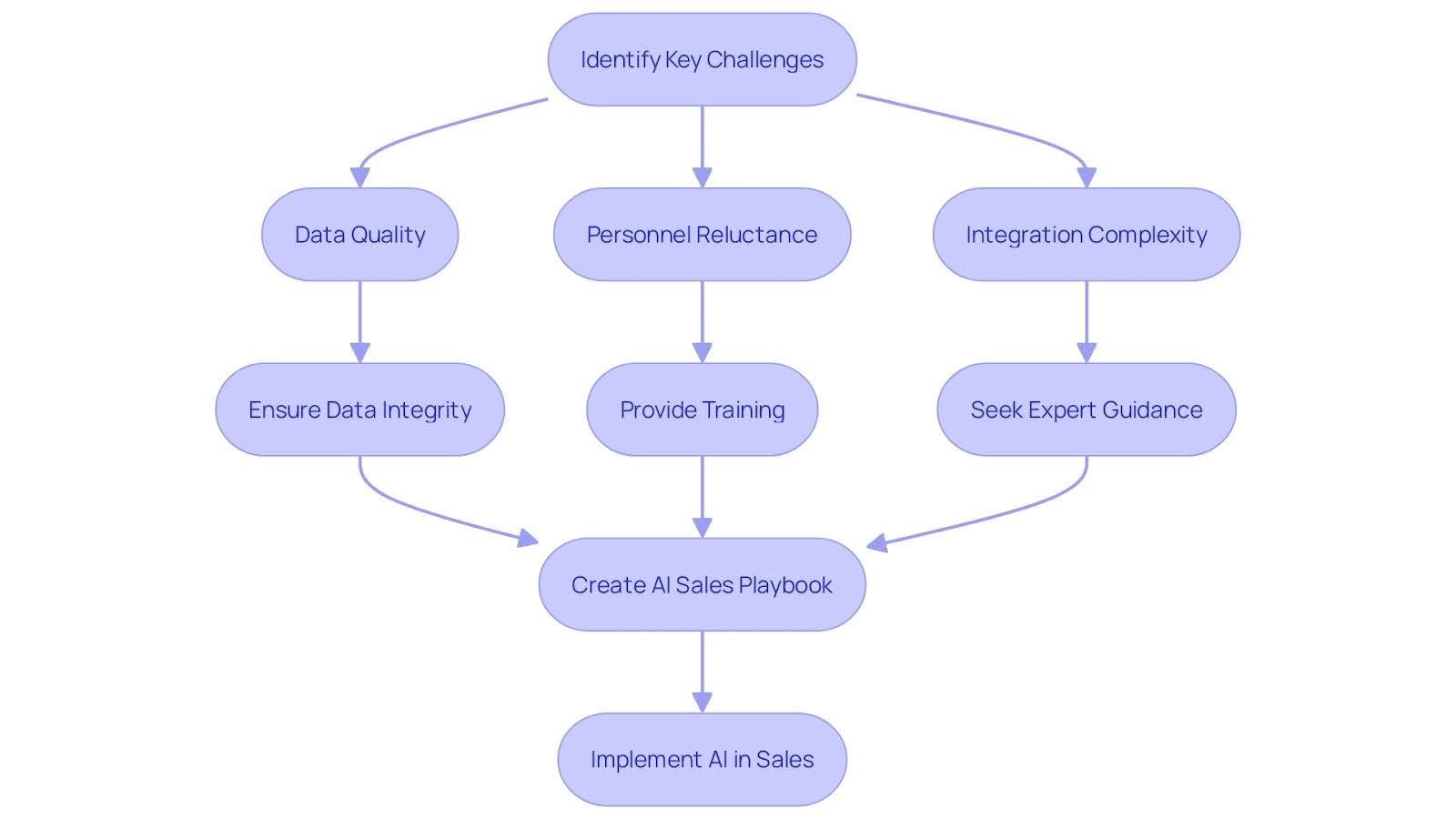
Conclusion
The integration of artificial intelligence in sales prospecting has emerged as a game-changer for businesses aiming to enhance their efficiency and effectiveness. By automating manual tasks and analyzing vast datasets, AI empowers sales teams to focus on high-value leads, ultimately driving revenue growth. The ability of AI to deliver actionable insights quickly transforms the prospecting process, enabling teams to connect with potential customers in a more meaningful and personalized manner.
Developing an effective AI prospecting strategy requires alignment of sales objectives with AI capabilities. Identifying ideal prospects, conducting thorough research, and crafting personalized outreach plans are critical steps that leverage AI’s strengths. This strategic approach not only streamlines processes but also enhances engagement through accurate customer segmentation and tailored messaging.
However, the adoption of AI is not without its challenges. Ensuring data quality, overcoming resistance to change, and navigating integration complexities are vital considerations. Proactive training and a clear understanding of AI’s role can mitigate these issues, allowing organizations to maximize the benefits of this technology.
By embracing AI thoughtfully and strategically, sales teams can maintain a competitive edge in an ever-evolving market landscape, driving sustained growth and success.
Read also: Ultimate guide to an AI sales funnel: the best tips, tools and common mistakes to avoid



